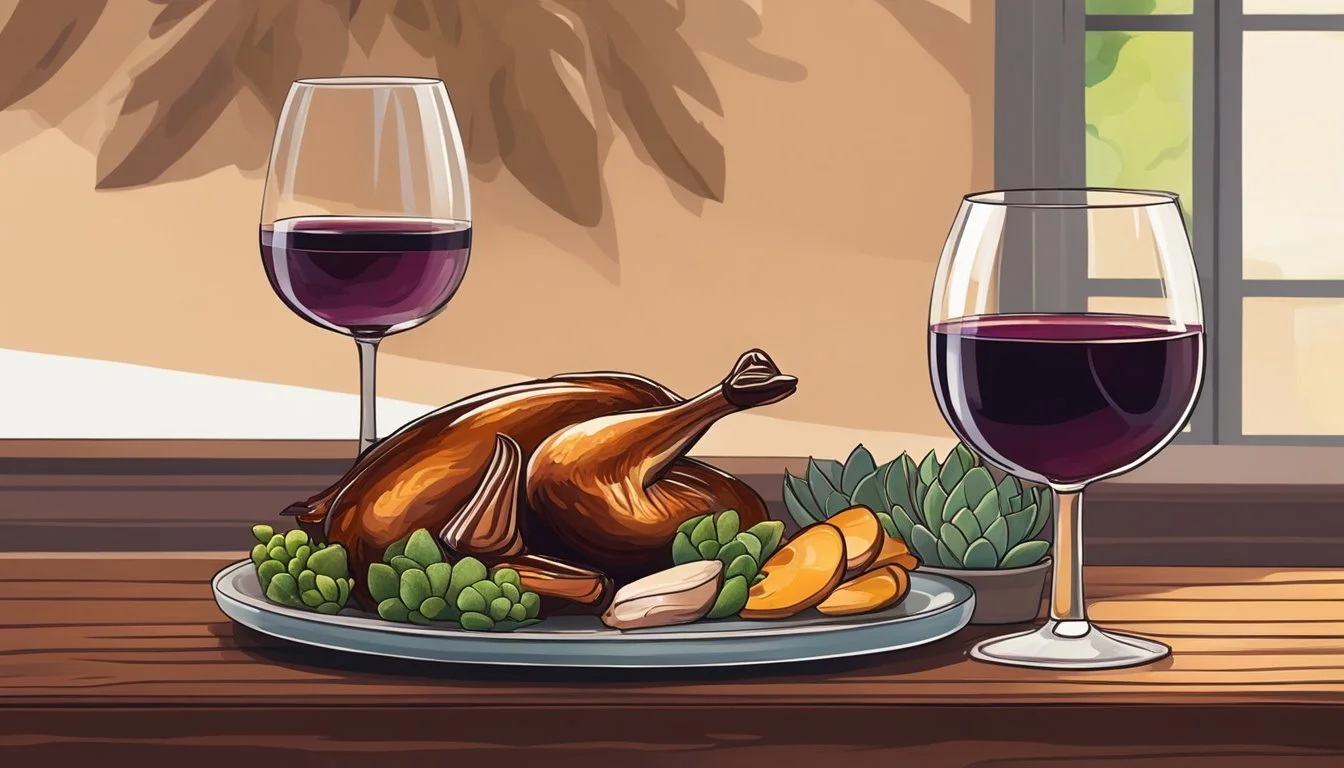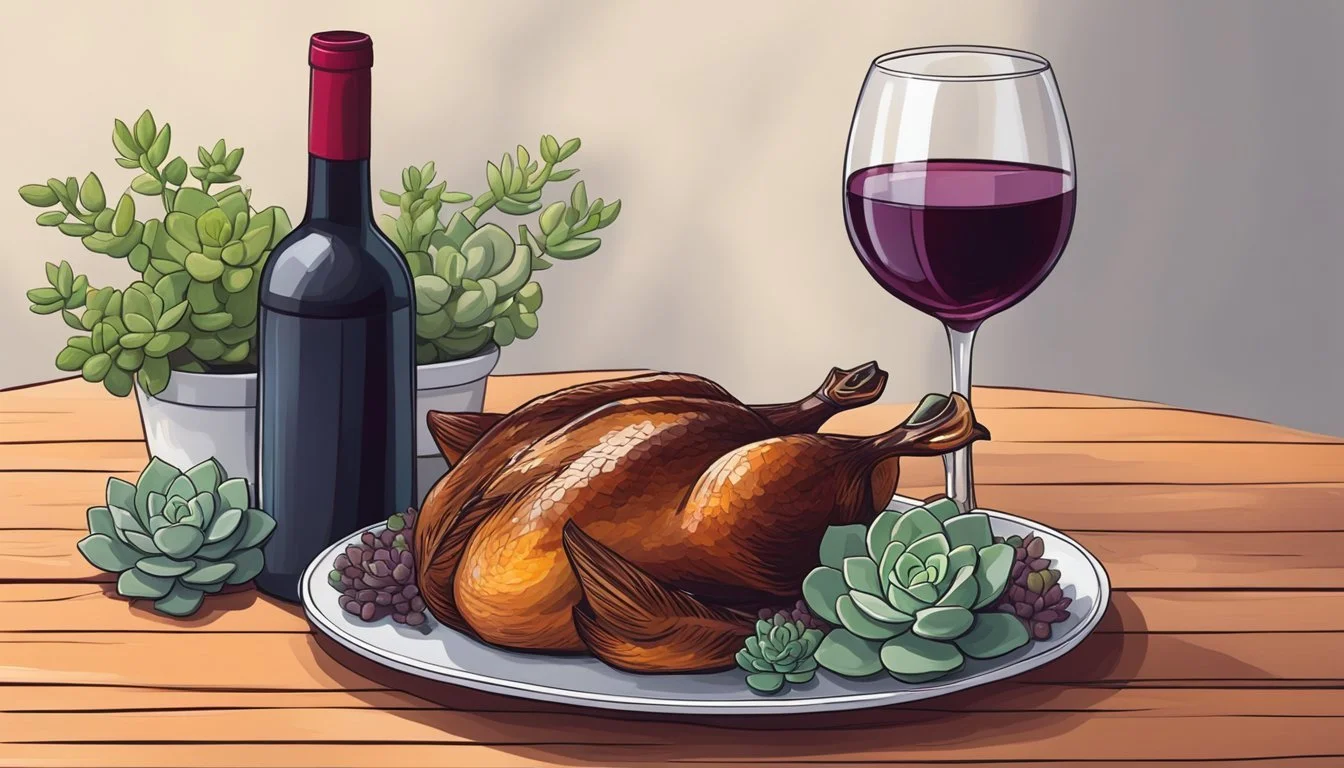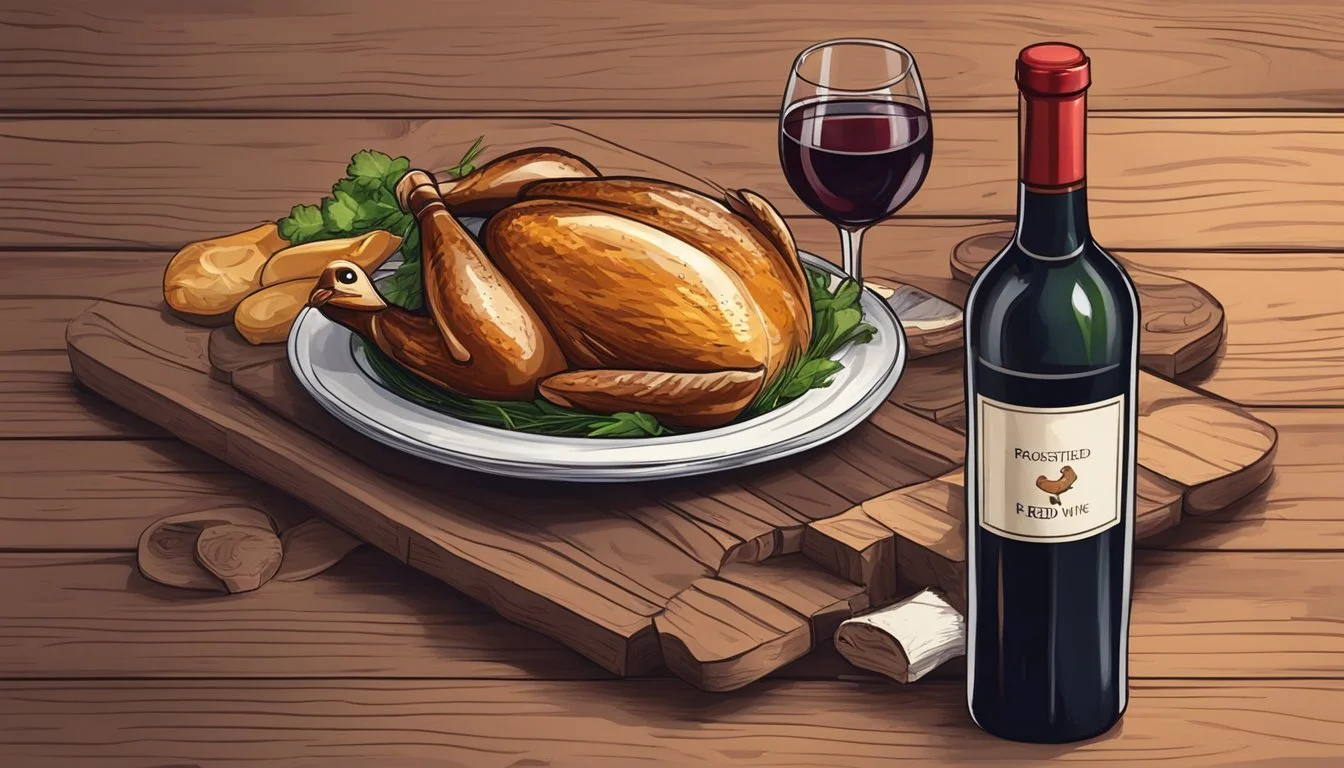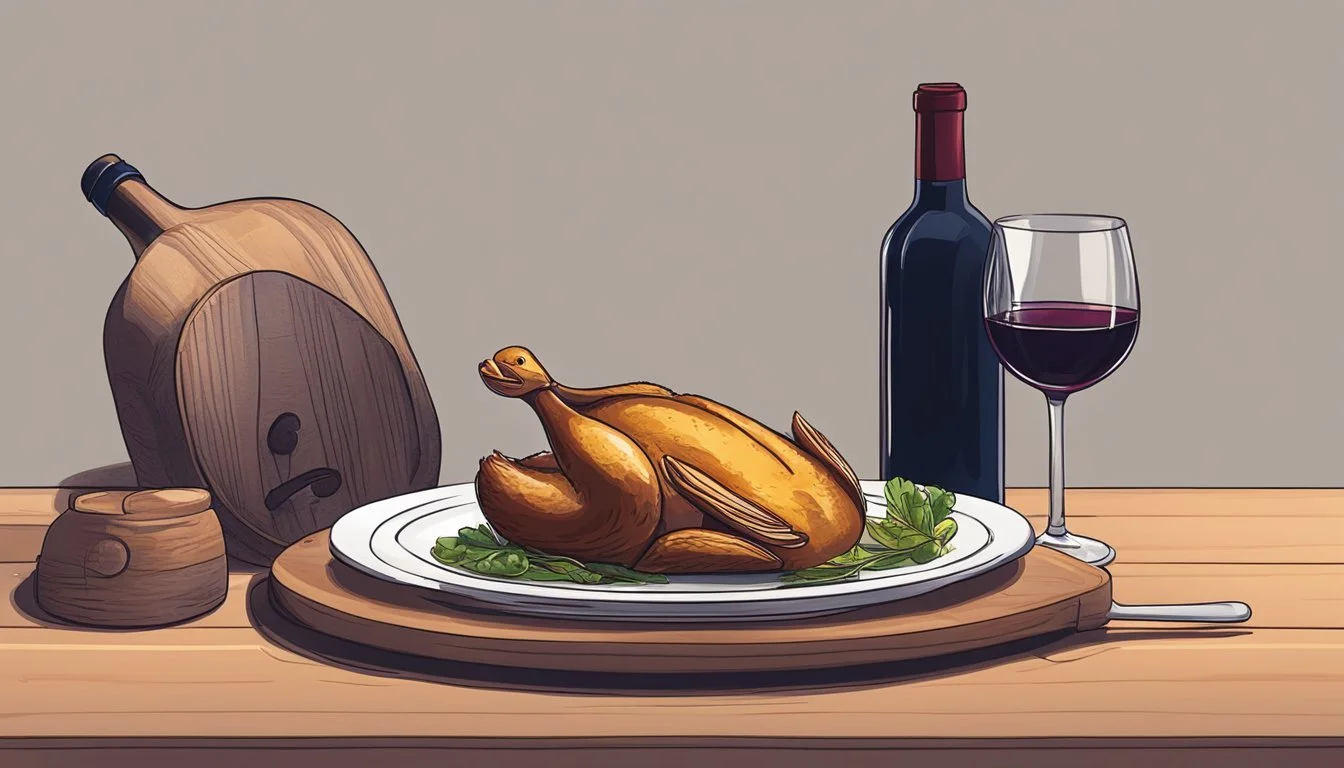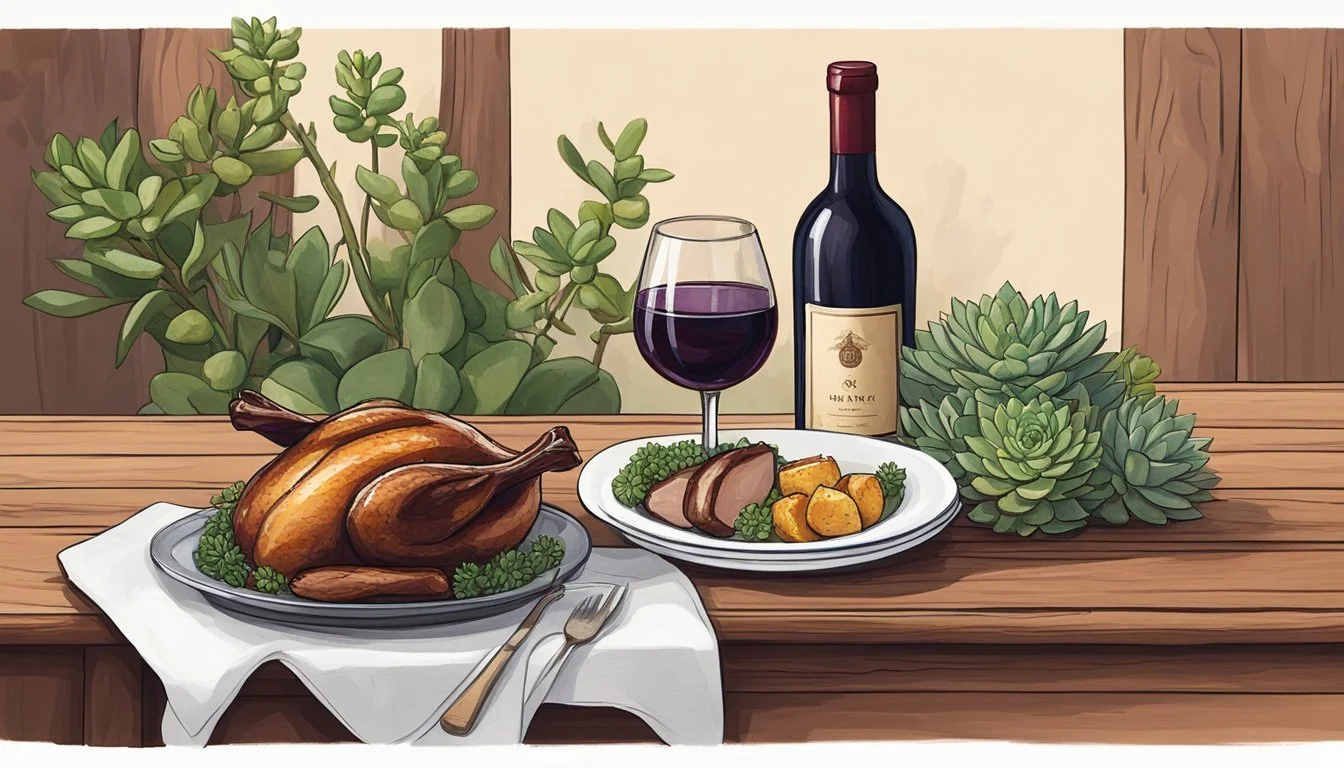What Wine Goes Well with Duck?
Expert Pairing Advice
Pairing wine with duck is an art that enhances the culinary experience. Duck, with its rich and slightly fatty profile, requires a wine that complements its flavors without overwhelming them. The ideal pairing balances the natural succulence of the duck while contrasting its richness. A classic option is Pinot Noir, known for its versatility and ability to pair with a range of duck dishes, from roasted to fruit-glazed preparations. It is the safest and most tried-and-true wine for duck, thanks to its moderate tannins and bright acidity that cut through the fat and match the texture of the meat.
Other red wines such as Gamay, with its fruity notes, and Malbec, with its deeper flavors, also align well with dishes like grilled duck or duck breast. For a more adventurous pairing, Syrah can introduce a spicy nuance that complements peppered duck dishes. On the white wine spectrum, a rich, buttery Chardonnay or a dry to off-dry Riesling can be the perfect accompaniment to duck confit (What wine goes well with duck confit?) or dishes with a sweeter profile like duck with hoisin sauce.
Selecting the right wine elevates duck from mere poultry to a showcase of gastronomic delight. Whether one opts for a red or a white wine, the key is to consider the preparation and seasoning of the duck dish to ensure that the wine's body, acidity, and flavor profile are in harmony with the meal.
Fundamentals of Wine Pairing
In the context of pairing wine with duck, one must consider acidity, tannins, and the body of the wine to complement the rich and fatty characteristics of the meat.
Understanding Acidity
Acidity in wine is essential to cut through the richness and fattiness of duck. Wines with higher acidity, such as Pinot Noir, create a palate-cleansing effect while eating, which enhances the overall flavor of the dish. If the duck is served with fruit glazes, a wine that mirrors the acidity in the glaze can elevate the dish.
Impact of Tannins
Tannins, found predominantly in red wines, can affect the taste experience significantly. They impart structure and a sense of dryness that can balance the natural fats in duck. So, when duck is served with a significant fat component, a tannic wine like Malbec may be an appropriate choice.
Importance of Wine Body
The body of a wine indicates its overall feel in the mouth, and it is crucial to match the body of the wine to the weight of the duck dish. A light-bodied white wine could be overshadowed by a rich duck preparation, hence, medium to full-bodied wines are generally more suitable. For instance, a well-structured Syrah or Cabernet Sauvignon pairs nicely with duck breast, due to their balance of dark fruit flavors and acidity.
The Profile of Duck
When considering wine pairings, the unique flavor and texture profile of duck meat is a pivotal factor. The rich, savory taste and various cooking methods contribute to the selection of an appropriate wine accompaniment.
Duck Meat Characteristics
Duck meat is distinctively rich and savory, often described as having a gamey flavor which sets it apart from other poultry. It is characterized by dark meat which is naturally fatty, contributing to a moist and tender texture when cooked properly. The fat content not only adds flavor but also plays a role in achieving crispy skin, a prized feature of well-prepared duck.
Common Duck Preparations
Various cooking methods can influence the final taste and texture of duck dishes:
Roasted Duck: Typically features a crispy skin with a juicy and tender interior.
Seared Duck Breast: Renowned for its succulent meat and ideally served medium-rare.
Duck Confit: Involves slowly cooking the duck in its own fat, producing tender and flavorful meat.
Smoked Duck: Infuses the meat with a deep smokiness that compliments its natural flavors.
Peking Duck: Known for its thin, crisp skin and is often served with hoisin sauce.
Duck a l'Orange: Showcases duck with a sweet and tangy citrus sauce.
Duck Pâté: A spread made from duck liver, offering a rich and creamy texture.
Envisioning the Perfect Duck Dish
The perfect duck dish often balances the fatty and savory elements of the meat with other components. A classic dish like duck confit is slow-cooked to achieve tender, flavorful meat, while roasted duck might be paired with root vegetables to complement its hearty nature. Whether it's duck a l'orange with its sweet citrus glaze or a smoked duck that carries a subtle woodiness, the central aspect lies in honoring the duck's inherent features while creating a harmonious dish.
Selecting the Right Wine
The key to complementing duck with wine lies in balancing the meat's richness with a wine's acidity, tannin, or sweetness. Here's how to choose confidently amongst red, white, or even sparkling wines for that perfect pairing.
Red Wines for Duck
For red wine lovers, Pinot Noir stands out due to its acidity and subtle tannins, making it a classic choice for dishes like duck confit. Merlot and Zinfandel, known for their fruity profiles, are excellent for sweeter duck preparations, such as those with a hoisin glaze. Those preferring robust options may opt for Syrah (or Shiraz), Malbec, and Cabernet Sauvignon, which can handle the smokiness of grilled duck. A lighter Beaujolais or Gamay can be delightful with a red fruit-glazed duck, while for something earthier, a Barolo or Bordeaux blend could be intriguing.
Pinot Noir: Acidic with subtle tannins, suits duck confit.
Merlot & Zinfandel: Fruity, suitable for sweeter sauces.
Syrah/Shiraz & Malbec: Robust, ideal for grilling.
Cabernet Sauvignon: Full-bodied, balances smoky flavors.
Beaujolais & Gamay: Light and fruity, pairs with glazes.
Barolo & Bordeaux: Offering depth for earthier dishes.
White Wines for Duck
A crispy duck dish pairs delightfully with a good Chardonnay, whose buttery notes enhance the duck's flavor. Drier white wines, such as German Riesling or Pinot Gris, cut through the fat and are outstanding with duck confit. For those looking for aromatic whites, Gewurztraminer or Chenin Blanc can provide a beautiful contrast to both the richness and the spices commonly found in duck dishes. Sauvignon Blanc offers zest and is particularly good with duck in citrus-based sauces.
Chardonnay: Buttery, complements crispy duck skin.
Riesling & Pinot Gris: Dry, excellent with duck confit.
Gewurztraminer & Chenin Blanc: Aromatic, contrasts richness.
Sauvignon Blanc: Zesty, perfect for citrus-infused duck.
Exploring Rosé and Sparkling Options
Not to be overlooked, a dry Rosé can serve as a versatile companion to duck, especially in summer months or with duck salads. Sparkling wines, like Prosecco, bring effervescence that can lighten up a duck dish, especially if it's served with a fatty sauce. The key with these choices is to ensure the wine has enough body to stand up to the texture of the meat and can match the character of the sauces involved.
Dry Rosé: Versatile, pairs well with duck salads.
Prosecco: Sparkling, lightens richer duck dishes.
Flavor Complementarity
Selecting the appropriate wine to pair with duck dishes is a nuanced process that hinges on harmonizing the wine's flavor profile with the various spices and ingredients used in the duck preparation.
Fruity and Spicy Notes
When the duck is prepared with fruit glazes or spicy elements, wines that exude fruity and spicy undertones can enhance the dining experience. For instance:
Fruit Glazes: A fruit-forward Pinot Noir with notes of cherry complements duck with a plum sauce or fruit glazes.
Spicy Elements: For duck dishes accented with ginger or pepper, a Syrah showcasing peppery notes creates a flavorful echo.
Matching Wines with Sauces
The sauce accompanying the duck has a substantial impact on the wine pairing:
Orange Sauce: An acidic white like Riesling balances the sweet tanginess of an orange sauce.
Mushroom Sauce: A Merlot, with its soft tannins and subtle earthiness, aligns well with a rich mushroom sauce.
Wine and Cooking Techniques
The technique used to cook the duck influences the intensity of flavors, requiring careful selection of wine to match:
Roasting: A Chardonnay or Pinot Noir pairs well, the former for its buttery notes with slow-roasted duck, and the latter for its versatile profile that stands up to the richer flavors.
Confit: For a duck confit, a dry German Riesling or a fruity Zinfandel complements the dish's depth and texture without overwhelming it.
By factoring in these elements of flavor complementarity, one can elevate the culinary experience of duck dishes through thoughtful wine pairing.
Regional Wine Pairings
Selecting the right wine to complement duck dishes is greatly influenced by regional wine specialities, which provide a tapestry of flavors that can elevate the dining experience. From the robust reds of Europe to the nuanced offerings of California, each region offers distinctive pairings that resonate with the unique preparations of duck.
European Influences
In Europe, the classic Burgundy wines, especially Pinot Noir, are highly esteemed for their affinity with duck. Whether the dish is a simple seared duck breast or a more complex duck confit, the delicate balance of fruit and acidity in a Pinot Noir from this region is an excellent choice. Chianti from Italy, with its notable acidic profile and rustic charm, can pair beautifully with tomato-based duck preparations. Meanwhile, Rioja from Spain might be selected for its deep berry notes and oak undertone, ideal for dishes with a smoky character.
Burgundy (Pinot Noir): Ideal for most duck dishes.
Chianti: Pairs well with tomato-infused duck recipes.
Rioja: Complements smoky duck flavors.
Californian Varieties
California offers a diverse array of wines that can be joyfully matched with duck. The state's Pinot Noir, while stylistically different from its Burgundian counterpart, still maintains a freshness and berry profile that goes well with a variety of duck dishes. Californian Zinfandel, known for its fruity yet spicy characteristics, can be a good match for duck in a sweet and sour sauce or with a fruit glaze.
Pinot Noir: Fresh, with berry notes suitable for duck.
Zinfandel: Fruity and spicy, excellent for sweet-and-sour duck glazes.
Unique Wine Regions
Lastly, some unique wine regions around the world contribute their own signature styles that are delightful with duck. Gewürztraminer from regions such as Alsace offer a perfumed nose and the spice that can highlight the flavors in Asian-spiced duck dishes. Wines from Bordeaux, with their bold structure and depth, can stand up to the richness of duck, particularly when prepared with a reduction or a berry sauce.
Gewürztraminer: Perfumed and spicy, perfect for Asian-spiced duck.
Bordeaux: Robust and deep, suitable for duck with rich sauces.
Serving and Presentation
The correct serving of wine can magnify its qualities and enhance the gastronomic experience, especially with a versatile dish like duck. Temperature, glassware, and presentation work in harmony, each with its unique characteristics, to maximize the enjoyment of the pairing.
Temperature and Decanting
Pinot Noir: Serve at 55-60°F (13-16°C); decanting is optional but not typically required.
Gamay: Ideal at 55-60°F (13-16°C); decanting for a short time can open up its flavors.
Malbec, Syrah, Cabernet Sauvignon, Merlot: Serve these fuller-bodied reds at 60-65°F (16-18°C); decant to allow the wine to breathe, enhancing its complexity.
For whites like Chardonnay and Riesling, chilling to 50-55°F (10-13°C) brings out their crisp, refreshing qualities.
Glassware Considerations
When selecting glassware, consider:
Pinot Noir: Use a wider bowl to allow the wine to aerate.
Chardonnay: A glass with a broader bowl emphasizes the wine's rich palate.
For bolder reds like Malbec and Syrah, opt for a glass with a large bowl to concentrate the bold aromas.
Proper glassware ensures each wine's unique characteristics, such as the aroma and palate, are fully expressed.
Pairing Wine with Presentation
A good wine pairing should align with not only the flavor of the duck but also with its presentation.
Roasted duck: Rich in flavor, pair with a robust red like Malbec, highlighted by a sleek, clear glass.
Duck with fruit glaze: A lighter Gamay, in a medium-sized glass, complements the fruit's sweetness.
Duck Confit: A traditional presentation, match with a delicate Pinot Noir which requires an elegant glass to reveal its delicate features.
The goal is to present a harmonious experience that elevates the dish's presentation and interplays with the diner's senses, providing joy in each bite and sip.
Advanced Pairing Concepts
When choosing wine to pair with duck dishes, experts consider the aging potential of the wine, the impact of vintage variability, and the allure of unconventional wine choices.
Aging Potential and Duck Pairings
Aged wines can elevate a duck dish, complementing its rich flavors with their developed complexity. For instance, an aged Burgundy with its earthy nuances can enhance the savoriness of duck confit. A wine’s aging process allows for tertiary aromas and flavors such as leather and forest floor to emerge, balancing the gamey notes of duck. When pairing wines with popular duck recipes such as duck pancakes or duck bahn mi, one must also consider the wine’s evolution over time and how its mature profile might interplay with the spices and herbs used in these dishes.
Evaluating Vintage Variability
Vintage variability significantly affects the wine pairing choices for duck. Different years yield varying intensities of fruit, acid, and tannins in wine, which can affect the overall balance when paired with duck. For example, a milder vintage of Pinot Noir might suit the subtle flavors of duck pancakes, while a bolder vintage could stand up to the rich, fatty flavors of a slow-roasted duck.
Adventurous Wine and Duck Combos
Beyond the tried-and-true pairings, there exist adventurous combinations wherein rare or unique wines create remarkable matches with duck. Exploring unique characteristics of lesser-known wines such as an orange wine or a high tannin Eastern European red can introduce exciting dimensions to dishes like duck bahn mi. When one ventures into such pairings, they uncover a realm where the synergy between an unconventional wine and a traditional dish creates a novel culinary experience.
Summary and Recommendations
When pairing wine with duck, one must consider the dish's rich flavor and often fatty texture. The goal is choosing a wine that complements these characteristics without overwhelming the palate. Here are confident and clear recommendations:
Pinot Noir: The acidity and freshness of a Pinot Noir provide a harmonious balance to the fat in duck. This wine is an excellent choice whether the duck is pan-fried or roasted.
Chardonnay: A buttery Chardonnay can be a delightful white wine alternative, pairing well with the richness of the duck.
Riesling: For Duck Confit, a dry to off-dry German Riesling is recommended. It brings a zesty freshness that cuts through the dish's richness.
Zinfandel or Merlot: With a duck dish that incorporates Hoisin Sauce, the fruity notes of Zinfandel or Merlot complement the sauce's sweetness.
Cabernet Sauvignon, Merlot, or Syrah: These full-bodied red wines enhance the earthy flavors of duck and are ideal for smoked or grilled preparations.
Grenache: For a lighter red wine option, Grenache offers a palatable match for duck, particularly when prepared without a heavy sauce.
To aid in selection, the following table summarizes the recommended wine pairings for various duck dishes:
Pan-Fried or Roasted Duck
Recommended Wine: Pinot Noir
Duck Confit
Recommended Wine: Pinot Noir or German Riesling
Duck with Hoisin Sauce
Recommended Wine: Zinfandel or Merlot
Smoked/Grilled Duck
Recommended Wine: Cabernet Sauvignon, Merlot, or Syrah
These pairings are suggested with the intent to elevate the dining experience, allowing both the wine and duck to shine in harmony. The recommendations provided are based on a knowledgeable and neutral consideration of flavor profiles and common culinary practices.
Recipes and Wine Pairings
Wine pairings with duck dishes range from reds like Pinot Noir to vibrant whites such as Riesling, chosen to complement the richness and flavor profiles of various duck recipes.
Classic Duck and Wine Pairings
For traditional dishes, certain wines have been long established as ideal complements.
Duck Confit: This classic dish pairs perfectly with a light and versatile Pinot Noir, which supports the rich, tender flavor without overwhelming it.
Roasted Duck: Its succulent taste works well with a medium-bodied Merlot or Chianti, both offering the necessary structure and fruitiness.
Duck a l'Orange: A dish with citrus notes typically pairs with a Gamay, providing a fruity balance to the sweetness of the orange glaze.
Innovative Pairing Ideas
Exploring less traditional pairings can yield delightful results.
Smoked Duck: It can be enhanced with Syrah, which echoes the smokiness of the dish.
Seared Duck Breast: Goes nicely with the bold notes of a Malbec, matching the intensity of the sear.
Seasonal and Festive Combinations
Wine pairings can also be guided by the seasons or festive occasions.
Peking Duck: During festivals, a rich Zinfandel matches well with the dish's complexity, ideal for celebratory dining.
Duck Pancakes: In the colder months, a Cabernet Franc's vibrant acidity cuts through the duck's fat, making it an excellent choice.
Duck Bahn Mi: For a summer refreshment, a chilled, dry Riesling brightens up this Vietnamese-inspired dish.
Conclusion
Selecting the perfect wine to accompany duck is essential for enhancing the dining experience. The key lies in balancing the dish's richness with the wine's acidity and flavor profile.
Pinot Noir remains a top choice due to its versatility and acidity that cuts through the duck's fattiness.
Gamay offers a fruity complement, ideal for duck dishes with a berry glaze.
Malbec, known for its boldness, pairs exceptionally well with grilled duck preparations.
Syrah harmonizes with peppery duck courses, matching the intensity of the spices.
Beaujolais and Merlot are recommended for slow-cooked or mildly flavored duck, providing a pleasant contrast with their light acidity.
For dishes like Bebek Goreng, an off-dry German Riesling can counterbalance the crispy texture and spices with its acidity and sweetness.
Duck Preparation and Wine Recommendation
Roasted Duck
Wine Recommendation: Pinot Noir
Duck with Red Glaze
Wine Recommendation: Gamay
Grilled Duck
Wine Recommendation: Malbec
Duck with Pepper
Wine Recommendation: Syrah
Slow-Cooked Duck
Wine Recommendation: Beaujolais, Merlot
Crispy Fried Duck
Wine Recommendation: German Riesling
When considering a wine to pair with duck breast, one should opt for wines that offer a harmonious blend of fruit presence and acidity, such as Cabernet Sauvignon, Merlot, or Syrah. These selections provide a balance that complements the luxuriant flavors inherent in the duck.
Choosing a wine to pair with duck is an art that enhances the flavors on the palate, creating a memorable meal.

